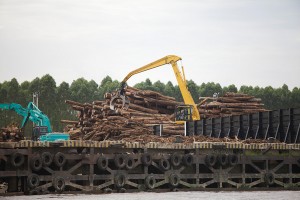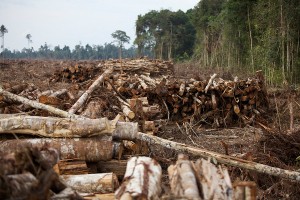Illegal logging is an extensive, systematic problem in Indonesia. A 2007 United Nations Environment Program report estimated that 73 to 88 percent  of timber logged in Indonesia is illegally sourced. More recent estimates place the figure at a lower, yet nonetheless startling 40 to 55 percent.
of timber logged in Indonesia is illegally sourced. More recent estimates place the figure at a lower, yet nonetheless startling 40 to 55 percent.
While illegal logging may happen in Indonesia, it is occurring, largely as a result of consumer demand for cheap wood products in other places, like the United States, and due to governments’ complicity for illegal products all along the supply chain. This undermines the strength and sustainability of the forest products’ economy in both Indonesia and the United States by distorting prices, undercutting sustainably manufactured products, and jeopardizing jobs and good working conditions.
In 2008 the U.S. government decided to take action to address the problems associated with illegal logging by amending its long-standing Lacey Act. The Lacey Act, which prohibits trafficking and sales of illegally sourced wildlife and plants, was amended to prohibit commerce in illegally sourced plants, including wood products. The new law was a significant change for the forest products sector and created a previously non-existent level of responsibility all along the supply chain.
So is the Lacey Act amendment working?
A recent report by Chatham House says yes. The study states it has “already identified positive effects of the Lacey Act amendment in terms of the response of producer and processing-country governments and the private sector.” The authors estimate that if cut down, the forests protected by these policies would have emitted between 1.2 billion and 14.6 billion tons of carbon dioxide – at the upper end, almost double the US’s annual greenhouse gas emissions.
Overall illegal logging declined as much as 25% worldwide over the past  decade – some of which has certainly resulted from new enforcement in consumer countries. While this is good news for forests, the Chatham House authors and RAN agree that there is much more to be done.
decade – some of which has certainly resulted from new enforcement in consumer countries. While this is good news for forests, the Chatham House authors and RAN agree that there is much more to be done.
The Lacey Act must be strengthened through the inclusion of highly processed wood products; companies in consumer nations must mandate that illegal and other controversial supplies are not entering their supply chain, and these market signals must be pushed down the supply chain to key manufacturing countries like China; governments in supplier nations like Indonesia must create and enforce meaningful policy; and a consistent global commitment to stem the trade of illegally sourced wood products must be made and enforced.
To learn more about RAN’s work on Indonesian deforestation, visit http://www.ran.org/category/issue/paper.











